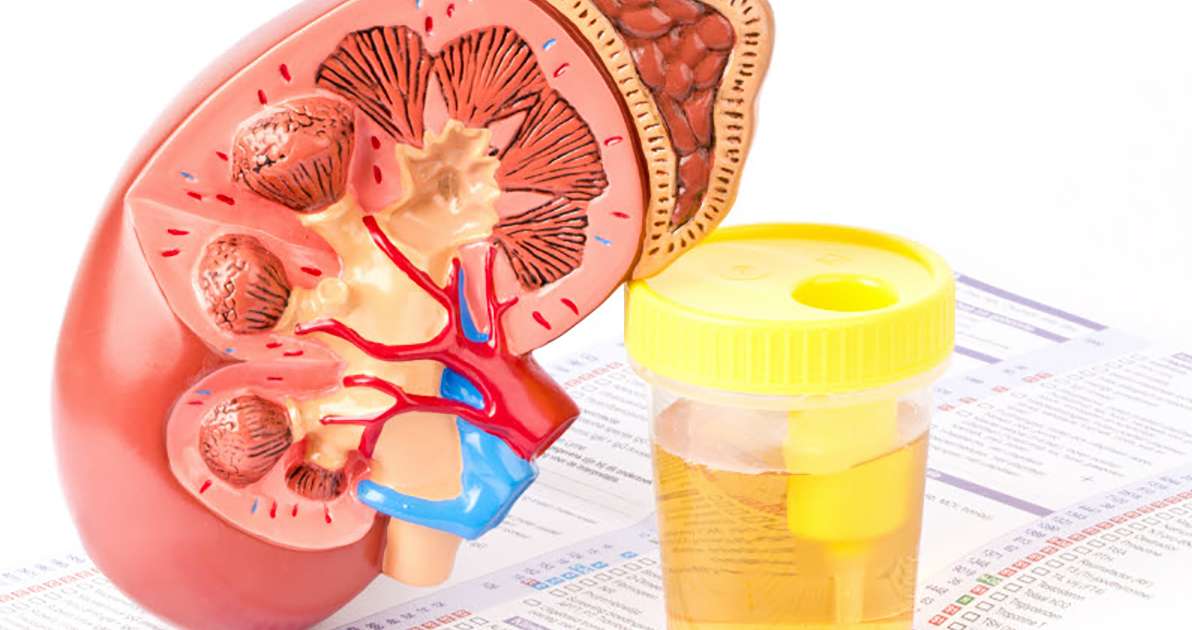A smartphone-enabled home urinalysis gadget and albumin home test kits are available to monitor kidney function at home if a person fears kidney injury or has chronic kidney disease.
Easy pee test: pee often doesn’t include albumin. Convenient and accurate in diagnosing albuminuria—the presence of albumin in the urine—a symptom of kidney disease, this test kit offers these features. A person may note the degree of albuminuria and schedule a medical appointment appropriately.
The dip.io test, or smartphone-enabled Kidney Function home urinalysis equipment, allows customers to do a urine test at home and share the findings with their physicians.
Clinical signs: In addition to routine blood pressure monitoring, symptoms such as urine color, blood or bad odor, and widespread body edema may be seen.
The kidneys are two bean-shaped, fist-sized organs Kidney Function that are situated beneath the rib cage on either side of the spine.
Table of Contents
Eight primary renal functions
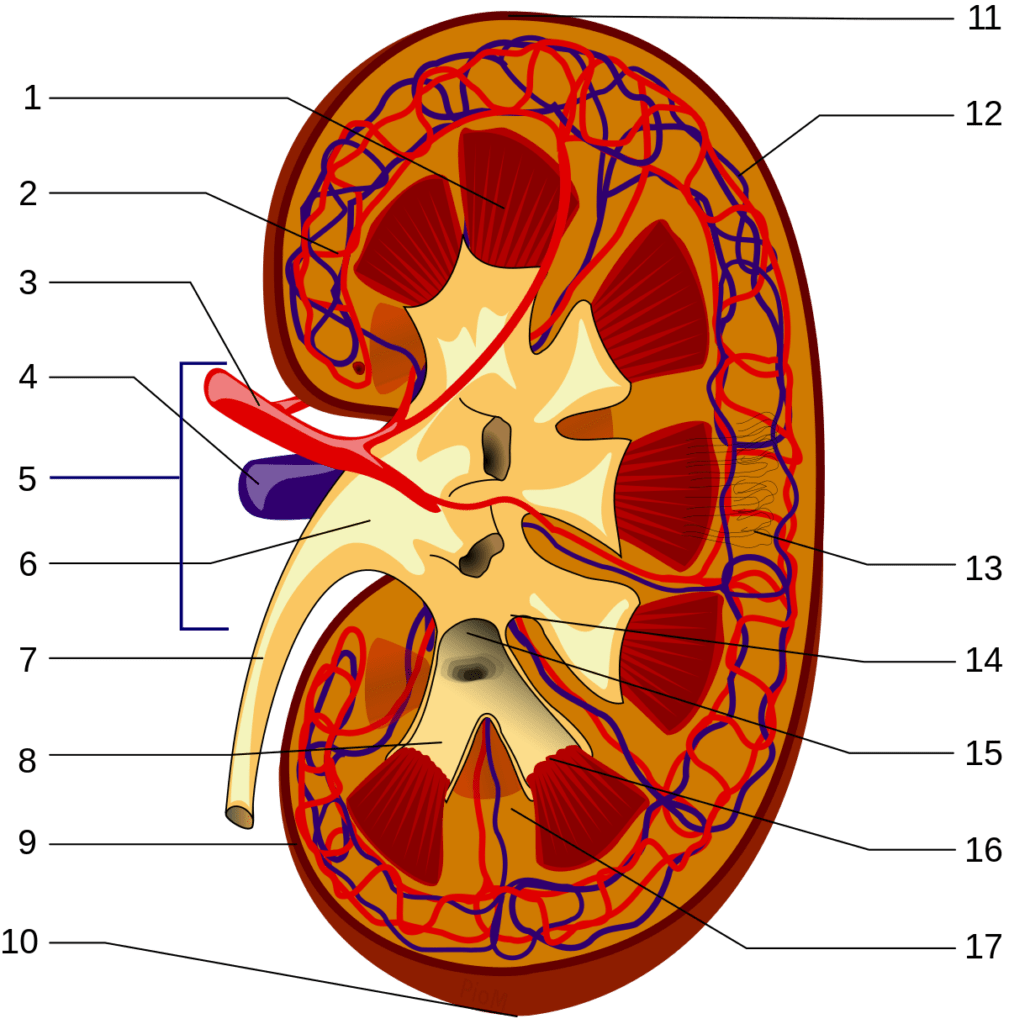
- Control of electrolyte levels, including acidity, salt, and potassium
- Waste product excretion
- Elimination of surplus fluid to preserve fluid-electrolyte equilibrium
- Elimination of medicines
- Keep the chemical equilibrium intact.
- hormones are released to control blood pressure.
- Creation of Vitamin D’s Active Form
- regulates the synthesis of red blood cells
37 million Americans suffer from kidney disease, making it the tenth most prevalent cause of death in the nation. But a lot of cases go unreported, undiagnosed, or untreated, or the symptoms manifest very late in the course of the illness Kidney Function
If someone is older than 60 or at risk for kidney disease due to high blood pressure, diabetes, or a family history of renal failure, it is imperative that they see a doctor and have their kidney functions evaluated every year.
17 warning signs of kidney problems
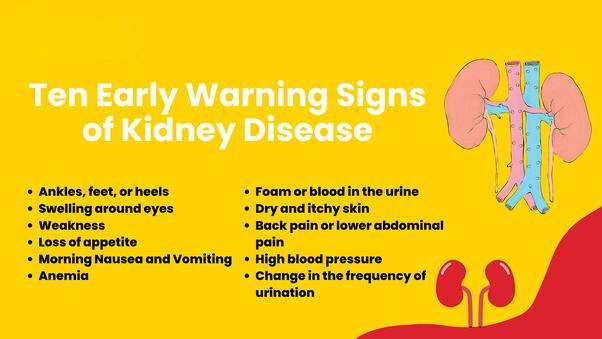
There are several physical signs and symptoms of kidney disease, which include:
- Extreme tiredness, weakness, or trouble concentrating
- Insomnia
- Dry and itchy skin
- Increased frequency or urgency to urinate
- Difficulty or pain while passing urine
- Foamy or frothy urine
- Puffiness around the eyes or swollen face
- Swelling of feet and ankles
- Loss or lack of appetite
- Muscle cramps
- Hematuria (blood in the urine)
- Feeling cold
- Shortness of breath even after a little exertion
- Feeling faint and dizzy
- Metallic taste in the mouth
- Bad breath (ammonia breath)
- Nausea, vomiting, or stomach upset
11 causes of kidney disease
Diabetes and high blood pressure are responsible for up to two-thirds of all cases of kidney Function
Other conditions that can affect the kidneys are:
- People older than 60 are at a higher risk
- Family history of kidney disease
- Obesity
- Black, Native American, or Asian American ethnicities
- Medications such as nonsteroidal anti-inflammatory drugs
- Recurrent kidney infections
- Glomerulonephritis (inflammation of the tiny filters in the kidneys called glomeruli)
- Inherited diseases, such as polycystic kidney disease (a genetic disorder that causes many fluid-filled cysts to grow in the kidneys)
- Trauma or injuries
- Lupus (an autoimmune disease)
- Obstructive diseases, such as kidney stones, prostate enlargement, and tumors
How is the diagnosis of a kidney illness made?
Kidney disorders are diagnosed using the tests listed below:
- Urine test: to determine whether the urine contains blood or protein.
- Blood examinations:
- Serum creatinine: A creatinine level greater than 1.2 mg/dL for women and 1.4 mg/dL for males, according to the National Kidney Foundation, indicates a kidney problem.
- Normal blood levels of blood urea nitrogen (BUN) should range from 6 to 20 mg/dL. A renal issue is indicated by a number greater than this.
- Glomerular filtration rate (GFR) computation: The blood creatinine, age, gender, ethnicity, and other variables can be used by the physician to determine the GFR.
- Computed tomography scans, or ultrasounds, can identify structural issues with the kidneys and urinary system.
- Kidney biopsy: A sample of kidney tissue is sent to a laboratory to be visualized under a microscope.
How can you prevent getting kidney disease?
A person can prevent kidney diseases by adopting the following measures:
- Consume a healthy and balanced diet: Eat a low-sodium and low-fat diet, including fresh fruits, fresh or frozen vegetables, whole grains, and low-fat or fat-free dairy products.
- Regular exercise: Increase physical activity and try to be active for at least 30 minutes on most days.
- Maintain a healthy weight
- Get enough sleep
- Avoid or quit smoking
- Limit alcohol intake</li>
- Control diabetes, blood pressure, and heart disease
Understanding Kidney Function
1. Role of the Kidneys
The kidneys perform several essential functions:
- Filtering Waste: Remove waste products and excess fluids from the blood.
- Balancing Electrolytes: Maintain a balance of electrolytes like sodium, potassium, and calcium.
- Regulating Blood Pressure: Produce hormones that help regulate blood pressure.
- Red Blood Cell Production: Produce erythropoietin, a hormone that stimulates red blood cell production.
2. Signs of Kidney Problems
Symptoms that may indicate kidney problems include:
- Fatigue: Feeling tired or weak.
- Swelling: Edema in the hands, feet, or face.
- Changes in Urination: Frequency, color, or amount of urine.
- Shortness of Breath: Due to fluid buildup in the lungs.
- Persistent Itching: Due to waste buildup in the bloodstream.
Home Methods to Check Kidney Function
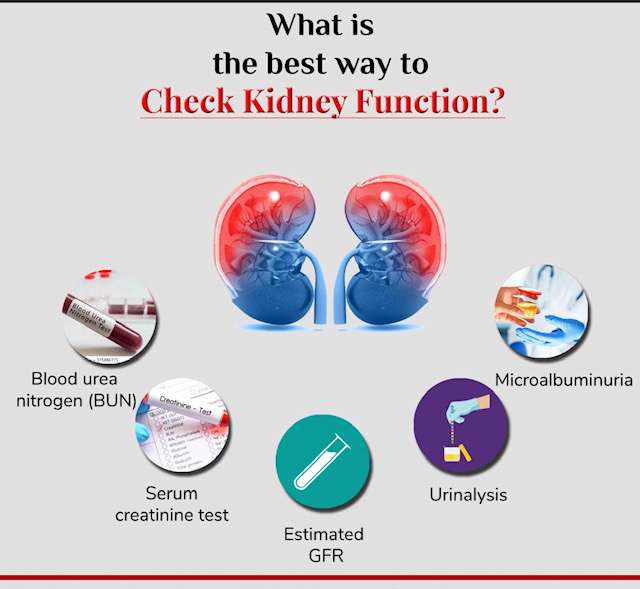
1. Urine Test Strips
Urine test strips are an easy and non-invasive way to monitor certain aspects of Kidney Function.
- How to Use:
- Purchase urine test strips from a pharmacy or online.
- Collect a urine sample in a clean container.
- Dip the test strip into the urine sample and wait for the recommended time.
- Compare the strip’s color change to the provided chart.
- What to Check:
- Protein Levels: High levels of protein in urine (proteinuria) can indicate kidney damage.
- Blood: Presence of blood in urine (hematuria) may suggest a kidney issue.
- pH Levels: Abnormal pH levels can signal kidney dysfunction.
2. Blood Pressure Monitoring
High blood pressure is both a cause and a consequence of kidney disease. Regularly monitoring your blood pressure can provide insights into your Kidney Function.
- How to Monitor:
- Use a home blood pressure monitor.
- Measure your blood pressure at the same time each day.
- Keep a log of your readings.
- Target Range:
- Normal blood pressure is typically around 120/80 mmHg.
- Consistently high readings may indicate kidney problems and should be discussed with a healthcare provider.
3. Monitoring Urine Output
Tracking your urine output can help you understand how well your Kidney Function are functioning.
- How to Monitor:
- Measure the amount of urine you produce in 24 hours.
- Normal urine output is about 800 to 2,000 milliliters per day if you drink about 2 liters of fluid.
- What to Look For:
- Increased Output: This can indicate issues like diabetes insipidus.
- Decreased Output: This may suggest kidney failure or dehydration.
4. Observing Changes in Urine
The appearance and frequency of your urine can provide clues about kidney health.
- What to Observe:
- Color: Dark urine may indicate dehydration or the presence of blood.
- Foaminess: Excessive foam can be a sign of protein in the urine.
- Frequency: Frequent urination, especially at night, might indicate kidney issues.
Lifestyle Practices to Support Kidney Health
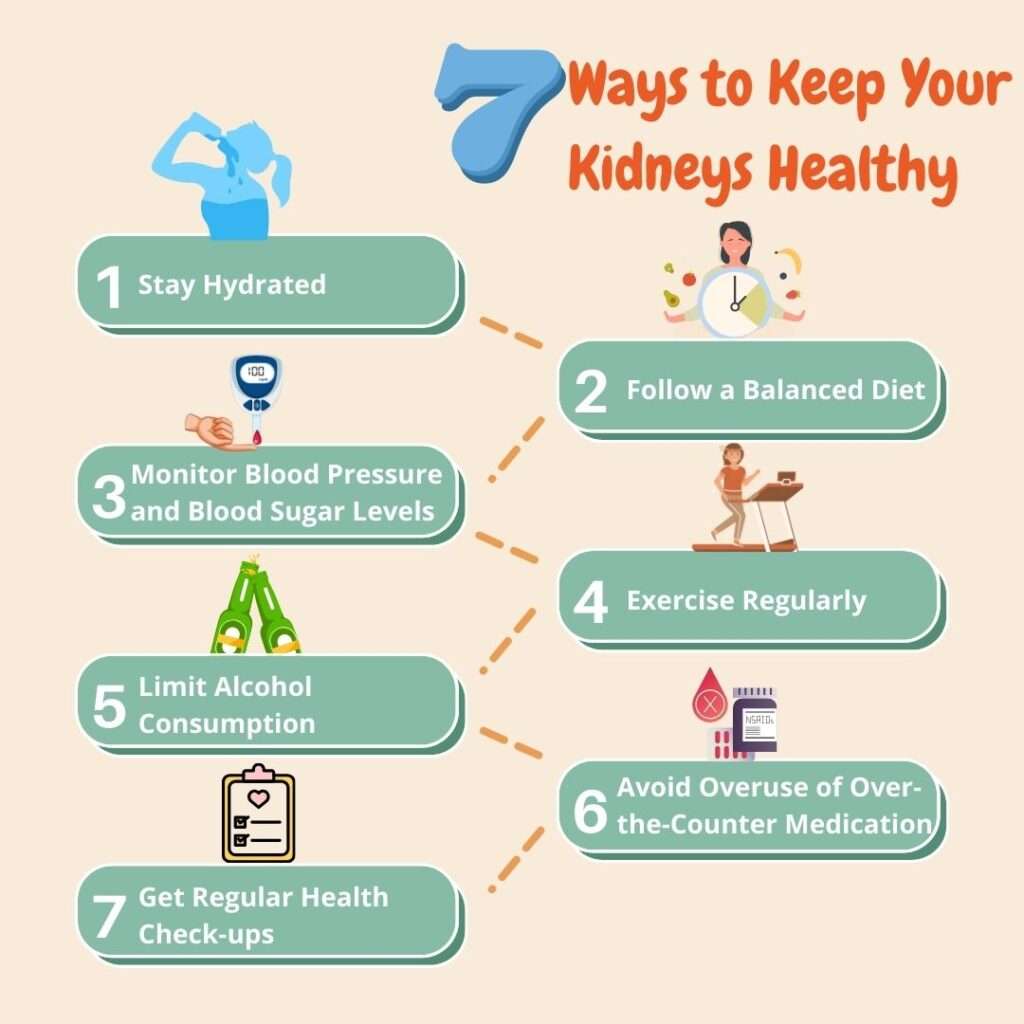
1. Hydration
Staying well-hydrated is crucial for kidney function.
- Guidelines:
- Drink plenty of water throughout the day.
- Aim for at least 8 glasses (2 liters) of water daily, unless advised otherwise by a doctor.
2. Healthy Diet
A balanced diet supports overall kidney health.
- Diet Tips:
- Limit salt and processed foods to reduce the strain on the kidneys.
- Eat plenty of fruits, vegetables, and whole grains.
- Avoid excessive protein intake, as it can burden the kidneys.
3. Regular Exercise
Exercise helps maintain a healthy weight and blood pressure, benefiting kidney health.
- Exercise Recommendations:
- Aim for at least 30 minutes of moderate exercise most days of the week.
- Include activities like walking, swimming, or cycling.
4. Avoiding Harmful Substances
Certain substances can damage the kidneys over time.
- What to avoid:
- NSAIDs: Nonsteroidal anti-inflammatory drugs, like ibuprofen, can harm the kidneys with long-term use.
- Alcohol and Tobacco: Excessive consumption can negatively impact kidney function.
- Unnecessary Supplements: Some herbal supplements and over-the-counter medications can be harmful to the kidneys.
Emerging At-Home Kidney Function Tests
1. Home Blood Tests
Recent advancements in healthcare technology have led to the development of at-home blood test kits that can be used to monitor kidney function. These kits typically measure key indicators such as creatinine and blood urea nitrogen (BUN).
- How to Use:
- Order a home blood test kit from a reputable supplier.
- Follow the instructions to collect a small blood sample, usually via a finger prick.
- Send the sample to the laboratory using the pre-paid packaging provided.
- Receive your results online or via a mobile app.
- Key Indicators:
- Creatinine: Elevated levels can indicate impaired kidney function.
- BUN: High levels of urea nitrogen in the blood can suggest kidney issues.
2. Digital Health Apps
Digital health apps and wearable devices are becoming increasingly popular for monitoring various health parameters, including those related to kidney function.
- How They Work:
- Wearable devices can track vital signs such as heart rate, blood pressure, and hydration levels.
- Mobile apps can log and analyze urine output, frequency, and other symptoms.
- Some apps offer reminders to take medications, drink water, and follow dietary recommendations.
- Benefits:
- Continuous monitoring and data collection.
- Personalized health insights and alerts.
- Easy sharing of data with healthcare providers.
Preventive Measures for Kidney Health
1. Regular Check-Ups
Even if you monitor your kidney function at home, regular medical check-ups are essential.
- What to Expect:
- Blood and urine tests to evaluate kidney function.
- Blood pressure monitoring.
- Discussion of any symptoms or concerns with your doctor.
2. Managing Chronic Conditions
Conditions like diabetes and hypertension significantly impact kidney health. Managing these conditions effectively can prevent kidney damage.
- Diabetes Management:
- Keep blood sugar levels under control.
- Follow your doctor’s recommendations for diet, exercise, and medication.
- Hypertension Management:
- Monitor and maintain a healthy blood pressure.
- Limit salt intake and follow a heart-healthy diet.
- Take prescribed blood pressure medications consistently.
3. Avoiding Overuse of Painkillers
Long-term use of painkillers, especially NSAIDs, can harm the kidneys. Limiting the use of these medications can help protect your kidney health.
- Alternatives:
- Use acetaminophen for pain relief, as it is generally safer for the kidneys.
- Explore non-pharmacological pain management techniques such as physical therapy, acupuncture, and relaxation exercises.
4. Staying Informed
Keeping up-to-date with the latest information on kidney health can help you make informed decisions about your lifestyle and healthcare.
- Resources:
- Reputable health websites and organizations such as the National Kidney Foundation.
- Health newsletters and journals.
- Educational seminars and workshops on kidney health.
Long-Term Kidney Health Management
1. Healthy Eating Habits
Adopting a kidney-friendly diet is crucial for maintaining long-term kidney health. Certain dietary adjustments can help manage existing conditions and prevent further kidney damage.
- Low-Sodium Diet: Reducing salt intake helps control blood pressure and reduces the burden on the kidneys.
- Balanced Protein Intake: While protein is essential, excessive amounts can strain the kidneys. Focus on high-quality protein sources like fish, poultry, beans, and nuts.
- Hydration: Drinking adequate water helps the kidneys flush out toxins. Aim for about 8 glasses a day, unless advised otherwise by a healthcare professional.
- Avoiding Processed Foods: Processed foods are often high in sodium and unhealthy additives. Opt for fresh, whole foods instead.
2. Regular Physical Activity
Regular exercise supports overall health and helps manage conditions like hypertension and diabetes, which can affect kidney function.
- Types of Exercise: Incorporate a mix of aerobic exercises (like walking, cycling, swimming) and strength training.
- Consistency: Aim for at least 150 minutes of moderate-intensity exercise per week.
- Benefits: Regular physical activity helps maintain a healthy weight, lowers blood pressure, and improves overall cardiovascular health, which is closely linked to kidney function.
3. Quitting Smoking and Limiting Alcohol
Smoking and excessive alcohol consumption can accelerate kidney damage and exacerbate underlying conditions.
- Smoking: Increases the risk of kidney cancer and damages blood vessels, reducing kidney function.
- Alcohol: Excessive drinking can lead to high blood pressure and liver disease, which indirectly affects the kidneys.
4. Monitoring and Managing Stress
Chronic stress can negatively impact your overall health, including kidney function. Implementing stress management techniques can contribute to better kidney health.
- Mindfulness and Meditation: Practices like mindfulness meditation can help reduce stress levels.
- Exercise: Physical activity is a natural stress reliever.
- Healthy Sleep: Ensure you get adequate sleep to help your body manage stress effectively.
5. Regular Screening for Kidney Health
Regular medical check-ups and screenings are essential for early detection of kidney problems.
- Frequency: If you have risk factors for kidney disease (such as diabetes, hypertension, or a family history of kidney disease), regular screenings are crucial.
- Tests: Common tests include blood tests (to check creatinine and GFR levels), urine tests (to check for protein or blood in the urine), and imaging tests if necessary.
Natural Remedies and Supplements
1. Herbal Supplements
Some herbal supplements are believed to support kidney health. However, it’s essential to consult with a healthcare provider before starting any new supplement.
- Cranberry: Known for its urinary tract benefits, cranberry supplements can help prevent urinary tract infections, which can affect kidney health.
- Dandelion Root: Traditionally used as a diuretic to help the kidneys eliminate toxins.
- Ginger: Known for its anti-inflammatory properties, ginger can support overall kidney function.
2. Probiotics
Probiotics support gut health, which can indirectly benefit kidney function.
- Sources: Found in yogurt, fermented foods, and as dietary supplements.
- Benefits: A healthy gut flora can help reduce inflammation and support the immune system.
3. Antioxidants
Antioxidants help protect the kidneys from oxidative stress and damage.
- Foods Rich in Antioxidants: Include berries, nuts, seeds, and leafy green vegetables in your diet.
- Supplements: Vitamin C and E supplements can also provide antioxidant benefits.
Recognizing When to Seek Medical Attention
Understanding when to seek professional medical help is vital for preventing serious complications related to kidney health.
1. Persistent Symptoms
Seek medical attention if you experience persistent symptoms such as:
- Severe or chronic pain in the lower back or side.
- Changes in urination: Frequency, color, or amount.
- Swelling: Persistent swelling in the hands, feet, or face.
- Unexplained fatigue: Constant tiredness that does not improve with rest.
- Breathlessness: Shortness of breath not related to physical exertion.
2. Follow-Up for Chronic Conditions
If you have chronic conditions like diabetes or hypertension, regular follow-up with your healthcare provider is essential to manage these conditions and protect your kidneys.
- Regular Monitoring: Keep track of blood sugar and blood pressure levels.
- Medication Adherence: Take prescribed medications consistently and report any side effects to your doctor.
When to Seek Professional Help
While home methods can provide useful insights, they are not a substitute for professional medical evaluation. If you notice any concerning symptoms or abnormalities in your home tests, it is important to consult a healthcare provider. Professional tests, such as blood tests (creatinine and GFR) and imaging studies, provide a comprehensive assessment of kidney health.
Conclusion
Regular monitoring of kidney function at home using urine test strips, blood pressure measurements, and observation of urine changes can help you stay informed about your kidney health. Coupled with a healthy lifestyle, these practices support overall kidney function and well-being. For accurate diagnosis and treatment, always seek advice from a healthcare professional
